Catalog Archive


Auction 152, Lot 160
De Bry's Influential Map of Colonial North America
"Floridae Americae Provinciae Recens & Exactissima Descriptio Auctore Iacobo le Moyne...", Bry, Theodore de

Subject: Colonial Southeast, Florida and Cuba
Period: 1591 (circa)
Publication: Grand Voyages, Part II
Color: Black & White
Size:
17.9 x 14.5 inches
45.5 x 36.8 cm
Download High Resolution Image
(or just click on image to launch the Zoom viewer)
(or just click on image to launch the Zoom viewer)